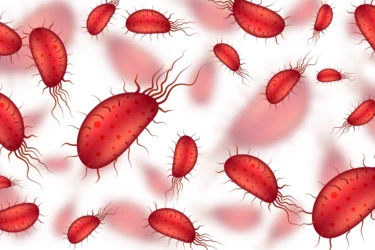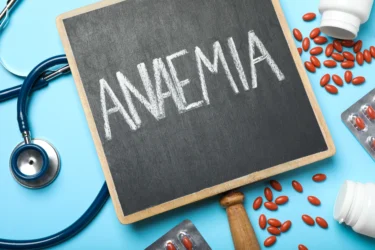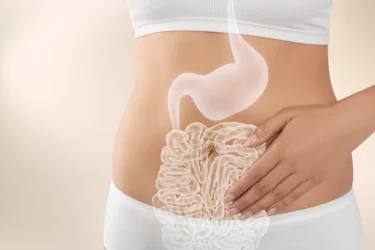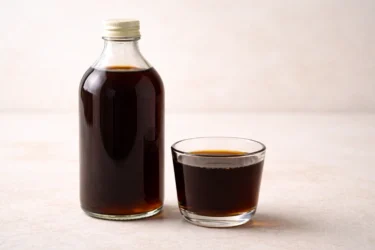Vidangarishta: Uses, Benefits, Side Effects and More!
By Dr Ashok Pal +2 more

Get,

to manage your symptom
Get your,


4 Cr+ families
benefitted

OTP sent to 9988776655



You’ve successfully subscribed to receive
doctor-approved tips on
Whatsapp

Get ready to feel your best.

Hi There,
Download the PharmEasy App now!!


Register to Avail the Offer
Send OTPBy continuing, you agree with our Privacy Policy and Terms and Conditions

Hi There,
Sign up on PharmEasy now!!
Trusted by 4 crore+ families

OTP sent to 9988776655



You have unlocked 25% off on medicines




Code: NU25
By Dr Ashok Pal +2 more
Table of Contents
In Ayurveda, the Asava-arishtas are commonly used for ages. Vidangaristha is one of the common aristhas prescribed. According to the Sarangadhar Samhitha, vidangaristha is prepared using traditional methods. It contains several herbs, which are fermented along with honey. The addition of honey is not only important for fermentation but also makes the preparation palatable1.
It is absorbed faster by the body and the herbs that are used in making it have their own set of properties; therefore, these kinds of formulations might be helpful against various pathogens in addition to the ailments they are prescribed for1,2.

Vidangaristha might possess the quality of killing the tiny organisms that reside in the body (microorganisms like bacteria and parasites) and might help soothe the stomach. Therefore, it might be helpful for Krumivyadhi (worm infections)1.
Vidangarishta is made using a traditional process which includes adding various herbs to water and reducing it, followed by the addition of honey. The dry ingredients are added to this concoction. The obtained liquid is then ready for fermentation. The following ingredients are utilised in the preparation of this herbal tonic1:
Vidangarishta is mainly used in Ayurveda because of the following potential properties:
Vidangarishta is a known Ayurvedic formulation which is believed to be a successful remedy for scalp illness (indralupta). In my experience, scalp illnesses may cause hair loss and require a proper diagnosis and intervention sooner or later5.
Dr. Siddharth Gupta, B.A.M.S, M.D (Ayu)

In a study2 conducted in 2010, it was found that vidangarishta might have an effect on the parasitic worms that infest the stomach. This effect is achieved by worm paralysing and worm destroying activity that it might possess. Most of the diseases caused by these worms that infest the stomach cause hardships to the host by causing pain and may even lead to stunting of growth2.
These statements are purely for explanatory purposes, and they should not be used to self-medicate or as a prescription. Although laboratory studies show the efficiency of vidangarishta in eliminating the worm infestation of the stomach, further human studies are required to prove it absolutely.

Anaemia can be caused due to infestation of worms in the stomach. The parasitic worms hog all the nutrients and might cause anaemia. Thus, as vidangarishta might be helpful against worm infestations, may also help with anaemia caused due to it2,3. However, more studies are required to prove such effects of vidangarishta. Kindly consult an Ayurvedic physician and do not self-medicate.

The bacteria-killing activity of various herbal preparations was compared in a study2. It was found that vidangarishta has a potential to curb the growth of a bacteria (E. coli), known to cause stomach infections, by almost 4-8% more than the other formulations. It was also found to have a potential to inhibit the growth of another bacteria (S. aureus) by almost 9-10%. This proves that vidangarishta might be helpful for bacterial infections and may help against certain infections too2.
The growth of the bacteria that cause food poisoning, stomach infections, pain in the stomach etc., is inhibited by vidangaristha. Thus, it is also used in managing these conditions2. However, more studies are required to prove such claims. Please consult a doctor. Do not self-medicate.

The potential use of vidangarishta to relieve the discomforts of the digestive system is wide ranged. It might be helpful to people experiencing loss of appetite (anorexia). It may help in building digestive fire in our bodies. As it might also function as a laxative, it may be helpful in relieving constipation as well4. It may help with diarrhoea, and dysentery (runny stools) too, which are caused due to certain worm infestations3. However, more research is required to prove such claims. Kindly consult a doctor. Do not self-medicate.

It was found in animal studies that vidangarishta might be helpful against seizures caused due to overstimulation of the central nervous system (CNS). This possible effect may be achieved due to its potential of inhibiting the stimulation of the CNS. Its potential effect may be noticed against both violent seizures (grand mal) and silent ones (petit mal). However, more research is required for its use in humans4. Seizures are serious and must be properly treated by a doctor.

It was found in animal studies that vidangarishta might help in decreasing the size of the tumour. This may be due to its potential effect of inhibiting the action of certain enzymes, which cause the growth of the tumour. The study4, showed the potential to reduce the size of a tumour in the bone, soft tissues and muscles (fibrosarcoma). However, more research on humans is necessary to provide concrete evidence4. Tumours are to be diagnosed and treated by a qualified doctor, hence, kindly consult a doctor.
Though there are studies showing the potential use of vidangarishta in various conditions, but these are insufficient and there is a need for further studies to establish the true extent of benefits of vidangarishta on human health.
In Ayurveda, kanchanar is revered for its potential to aid a variety of ailments, including cervical lymphadenitis, haemorrhage, rectal prolapse, menorrhagia, leukoderma, etc. It serves as a primary constituent in several Ayurvedic polyherbal preparations, including Vidangarishta, Ushirasava, and Kanchanara Guggulu5.
Dr. Rajeev Singh, BAMS
Vidangarishta is a fermented Ayurvedic preparation available in liquid form. The dosage and method of use will be prescribed to you by your Ayurvedic doctor based on your health needs. It is advised to consult your physician before the consumption of vidangarishta.
You must consult a qualified doctor before taking any herbal supplements. Do not discontinue or replace an ongoing treatment of modern medicine with an ayurvedic/herbal preparation without consulting a qualified doctor.
Also Read: Pistachios: Uses, Benefits, Side Effects By Dr. Rajeev Singh
There is a need for more studies to state the side effects of vidangarishta. However, if discomfort or any other symptoms are experienced on its use, it should be immediately reported to your physician as they will be the best judge of the situation and guide you regarding the further course of action. Even though it is a natural preparation, certain side effects may be seen as individual bodies react differently to certain compounds. Kindly do not self-medicate.
Also Read: Draksharishta: Uses, Benefits and Side Effects By Dr. Smita Barode
The specific precautions to take with vidangarishta will be best explained by your doctor who prescribes it. However, extra care needs to be taken by:
Also Read: Psyllium Husk (Isabgol): Uses, Benefits & Side Effects
Even though no specific drug interaction of vidangarishta has been reported, there is always a possibility of certain drugs reacting. Therefore, an Ayurvedic physician can appropriately guide you as per your condition. Kindly do not self-medicate and ensure that you disclose all the medications being used currently to your doctor so that they get a clearer picture of your overall health condition.
Also Read: Bael: Uses, Benefits & Side Effects
Vidangarishta might be helpful against stomach worms. It may also help with certain bacterial infections, food poisoning, etc. However, it is recommended to consult your Ayurvedic physician before consuming it for such purposes2.
Yes, vidangarishta is an Ayurvedic preparation made by using many potent herbs which contain various properties. It may be mainly helpful for worm infestations of the stomach1.
Special precaution is to be taken by pregnant women for consuming vidangarishta. It is recommended to follow your doctor’s advice and prescription in such situations.
Vidangarishta may be mainly prescribed for the management of parasitic worm infections in the stomach. However, it may also be prescribed for diabetes, kidney stones, abscess, fistula, urustambha (a disease characterised by pain in the thigh), etc1.
There are no published reports regarding the beneficial effects of vidangarishta on the eyes.
Anaemia can also be caused due to blood loss caused by the infestation of worms in the stomach. As vidangarishta might help against such worms, it might be effective in such situations1,3. However, more research is required to prove such claims. Kindly consult an Ayurvedic physician.
Precaution should be taken, and the dosage and method of use (as prescribed by your Ayurvedic physician) should be strictly followed while giving vidangarishta to children.
No beneficial effects of vidangarishta on the skin have been recorded.
Vidangarishta is a fermented herbal preparation containing self-generated alcohol. It contains alcohol which is produced during the fermentation process. This alcohol content is within healthy limits and enhances the medicinal properties of the herbs present1.
There are no reports and records stating the beneficial effects of vidangarishta for hair.
1. Shaikh SA, Dubewar AP, Shete AA. A pharmaceutico-analytical study of Vidangarishta. Available from: https://jaims.in/jaims/article/view/717
2. Praveen Kumar S V, Sandeep M, Kamal D, Nishanth BC, Megharaj HK, Prashith Kekuda TR, et al. Antibacterial and Anthelmintic activity of selected fermented Ayurvedic herbal formulations. Drug Invent today. 2010;2(7):5–9. Available https://www.researchgate.net/publication/259459311_Antibacterial_and_Anthelmintic_activity_of_selected_fermented_Ayurvedic_herbal_formulations
3. Jourdan PM, Lamberton PHL, Fenwick A, Addiss DG. Soil-transmitted helminth infections. Lancet. 2018;391(10117):252–65. Available from: https://www.who.int/news-room/fact-sheets/detail/soil-transmitted-helminth-infections
4. Rout S, Sahoo G, Padhy D, Universit SS. Embelia ribes Burm F . ( Vai Vidanga ) – An Overview. 2021;10:1–12. Available from: https://www.researchgate.net/publication/353548712_Embelia_ribes_Burm_F_Vai_Vidanga-_An_Overview
5. Kumari I, Kaurav H, Chaudhary G. Bauhinia variegate (Kanchnara), an ornamental plant with significant value in Ayurvedic and folk medicinal system. Himalayan J Health Sci. 2021;6(2):1–? [Internet]. Available from: https://www.hjhs.co.in/index.php/hjhs/article/view/94/73
Disclaimer: The information provided here is for educational/awareness purposes only and is not intended to be a substitute for medical treatment by a healthcare professional and should not be relied upon to diagnose or treat any medical condition. The reader should consult a registered medical practitioner to determine the appropriateness of the information and before consuming any medication. PharmEasy does not provide any guarantee or warranty (express or implied) regarding the accuracy, adequacy, completeness, legality, reliability or usefulness of the information; and disclaims any liability arising thereof.
Links and product recommendations in the information provided here are advertisements of third-party products available on the website. PharmEasy does not make any representation on the accuracy or suitability of such products/services. Advertisements do not influence the editorial decisions or content. The information in this blog is subject to change without notice. The authors and administrators reserve the right to modify, add, or remove content without notification. It is your responsibility to review this disclaimer regularly for any changes.
Comments

Leave your comment...
You may also like
Comments